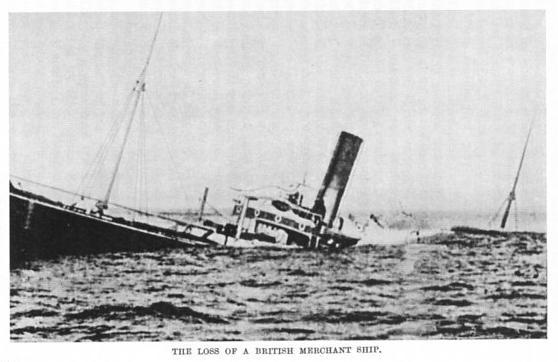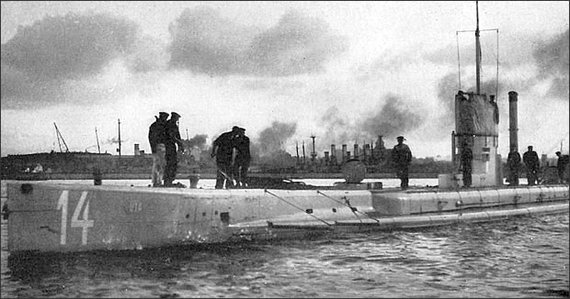The Submarine War
Submarine craft have existed since the 18th century and more primitive versions date back even further. The First World War, however, was the first conflict in which submarines were widely deployed and were they played a major role in shaping both the course and the final outcome of the conflict.
German submarine deployment was focused primarily on the Atlantic and to a lesser extent the Mediterranean. The Atlantic, however, was the decisive theatre, principally the seas around the British Isles, the North Sea and the coast of France. What came to be called the Battle of the Atlantic pitted the German submarine fleet against the combined naval forces of Great Britain and France, and later those of the United States. At stake was Germany's attempt to cut off Great Britain from access to overseas sources of foodstuffs and raw materials and force her out of the war and later, to prevent American men and materials from joining the Allied war effort.
The Allies successfully combated the German U-boat menace through a combination of tactics, such as conveys and aerial reconnaissance, and through new military technology, such as depth charges. An early version of sonar, or ASDIC as it was originally called, was developed in 1917, but was not deployed until after the war had ended. Despite these responses, Germany came perilously close to closing Britain's Atlantic lifeline. In the process German U-boats sank nearly half of Britain's merchant marine fleet, with considerable human losses.
German firms like Krupp had been building U-boats for the German navy since before the war. By 1914 Germany had a total of 33 submarines, of which five were short-range defensive types and the rest highly effective long-range boats. With the German High Seas Fleet bottled up in its ports, Grand Admiral Alfred von Tirpitz argued that the only effective way Germany had of enforcing its own blockade was the use of U-boats. With this decision, no hostile merchant vessel was safe from the scourge of the U-boats and unrestricted submarine warfare.
Initially, the U-boat campaign was directed against the British Grand Fleet. Later, U-boats were directed against merchant shipping and the trade routes of the Entente Powers. Germany's policy of unrestricted submarine warfare proved to be a major factor in swaying American public opinion to enter the war on behalf of the Allies.
On August 6, just two days after the British declaration of war, ten German U-boats sailed from their base in Heligoland in northwest Germany to attack Royal Navy warships in the North Sea. This was the first wartime submarine patrol in history. The patrol was unsuccessful. One U-boat, U-9, broke down and returned to port without seeing any action. U-15 was rammed by the British Light Cruiser HMS Birmingham and sliced in half. It promptly sank. A third, U-13, was reported missing and believed to have been sunk by a mine. While the patrol was unsuccessful, the greater range of operation exhibited by the patrol raised concerns at the Admiralty about the vulnerability of Royal Navy anchorages, at the same time, however, the Navy continued to discount the threat that submarines could pose to large surface vessels.
German Submarine U-14
They were soon to be dissuaded from this belief by a string of successful U-boat attacks. On September 5, U-21 torpedoed the Royal Navy light cruiser HMS Pathfinder. Two weeks later, U-9 found and sank three old armored cruisers: HMS Aboukir, HMS Cressy and HMS Hogue. Three weeks later, U-9 struck again sinking another old cruiser, HMS Hawke. The sinking of this many cruisers caused considerable alarm at the Admiralty and raised doubt about the security of the fleet's main anchorage in Scapa Flow. British war ships were immediately redeployed to ports in eastern Ireland and western Scotland until additional security measures could be installed at Scapa Flow. While the losses had been minor, they had succeeded in forcing one the world's most powerful naval fleets to temporarily abandon its home base.
On November 23, despite the new precautions taken, U-18 was able to penetrate the defenses at Scapa Flow and enter the anchorage but found the fleet absent. It was subsequently spotted and eventually forced to surface and surrender. On the very last day of the year, U-24 sighted the British battleship HMS Formidable on maneuvers in the English Channel and sank her.
The first attacks against merchant ships commenced in October 1914. On October 14, the British Merchant ship SS Glitra became the first British merchant vessel to be sunk by a German submarine. U-17 stopped and searched the vessel. In accordance with the prevailing rules, the crew was placed in lifeboats and then the seacocks were opened to sink the Glitra. U-17 never actually fired upon her.
On October 20, less than a week later, U-24 became the first submarine to attack an unarmed merchant vessel without warning, torpedoing the steamship Admiral Ganteaume. The ship was carrying 2,500 Belgian refugees and the U-boat commander claimed he had mistaken her for a troopship. Fortunately it did not sink and was towed to the French port of Boulogne with minimal loss of life. On January 30, U-20 torpedoed and sank the steamers SS Ikaria, SS Tokomaru and SS Oriole without warning.
Within 90 days of the onset of World War I it had already become evident that the submarine would play an important role in the conflict and that it would revolutionize the conduct of naval operations. Within a few months, the German government would announce a policy of "Unrestricted Submarine Warfare" and open a new chapter in the history of naval warfare.


